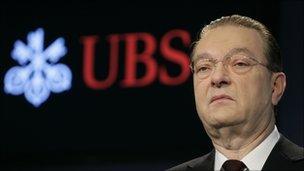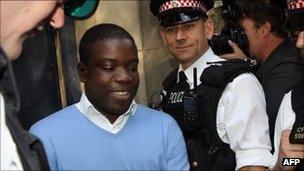UBS 'rogue trader': Loss estimate raised to $2.3bn
- Published

UBS boss Oswald Gruebel told a Swiss newspaper he would not resign over the incident
UBS has raised its estimated losses due to alleged unauthorised trading to $2.3bn (£1.5bn) from an initial $2bn.
The bank also said, external the alleged activity by trader Kweku Adoboli was uncovered after UBS began making inquiries.
That prompted Mr Adoboli to admit the losses on Wednesday, UBS said. The trader was charged with fraud and false accounting at a London court on Friday.
The bank's statement comes as UBS boss Oswald Gruebel insisted he would not resign over the incident.
"I'm responsible for everything that happens at the bank," Mr Gruebel told Swiss Sunday newspaper, der Sonntag. "if you ask me whether I feel guilty, then I would say no."
'Fictitious' hedges
Mr Adoboli has been remanded in custody until a committal hearing on 22 September.
According to the charges, the fraud took place between January and September this year.
The charges add that Mr Adoboli filed false accounts between October 2008 and December 2009, and from January to September 2011.
However, UBS latest statement said the losses only related to trading positions taken on in the last three months.
The 31-year-old worked for UBS's global synthetic equities division, buying and selling exchange traded funds, which track different types of stocks or commodities such as precious metals.
Prosecutors say Mr Adoboli "dishonestly abused that position intending thereby to make a gain for yourself, causing losses to UBS or to expose UBS to risk of loss".
The UBS statement claimed Mr Adoboli had conducted legitimate derivative transactions, giving the bank heavy exposure to various stock market indexes.
But he had then entered "fictitious" hedges against these positions into UBS' risk management system, while in reality he had no hedge in place and was breaching the risk limits that the bank required him to work within.
Stock markets have fallen 10%-20% in the past two months on growing fears of a renewed recession in the US and a disorderly debt default by Greece.
"Following inquiries directed to him by UBS control functions that were reviewing his positions, the trader revealed his unauthorized activity on September 14, 2011," the UBS statement said.
The bank said it was now operating within normal risk limits, implying that the unauthorised positions had been hedged or unwound.
Political pressure
BBC business editor Robert Peston reports that Mr Adoboli worked in the back office before becoming a trader, which may explain how he managed to keep his trading secret.
The Financial Services Authority (FSA), the City regulator, in conjunction with its Swiss counterpart, FINMA, has launched an investigation, external into why the Swiss bank did not identify the trades.
UBS said in its latest statement that it too had launched an internal inquiry.
City of London Police said in a statement that its "investigation is ongoing and officers continue to work in close collaboration with the FSA (Financial Services Authority), SFO (Serious Fraud Office) and CPS (Crown Prosecution Service)."
Mr Adoboli has taken on the law firm Kingsley Napley, which also represented Nick Leeson, the rogue trader who brought down Baring's bank.
According to reports he is the son of a retired United Nations employee from Ghana, and that he attended school and university in Britain.
All three major ratings agencies - Moody's, Standard & Poor's and Fitch - are reviewing UBS' credit rating for a possible downgrade in light of the apparent failure of the bank's risk control systems.
'Much riskier'

Mr Adoboli appeared before magistrates on Friday
Moody's says it is reviewing UBS's rating, focusing on "ongoing weaknesses" in the Swiss bank's risk management.
It comes after UBS lost £35bn in the 2007-8 banking crisis and had to be bailed out by Swiss taxpayers.
Moody's said that although UBS was strong enough financially to absorb the loss, it had concerns about its risk controls.
"We have continued to express concerns with regards to the ability of management to develop a robust risk culture and effective control framework," the agency said.
Last month the bank announced 3,500 job cuts. Of the 65,000 staff worldwide about 6,000 are in the UK, with the bulk of UBS's investment banking operations based in London and New York.
It has been reported that the fresh losses from the investment bank will lead to a major restructuring of the business, involving thousands more job losses, which will be announced in November.
"We believe that yesterday's event could have personnel consequences on senior management level, which in turn could lead to adjustments to UBS' business portfolio," said Teresa Nielsen, an analyst at the Swiss bank Vontobel.
"The exit from non-core businesses inside the investment bank could be accelerated," she added.
- Published18 September 2011
- Published15 September 2011
- Published6 August 2011
- Published6 October 2010